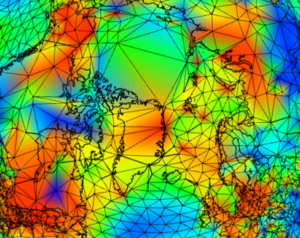by Tohoku University, November 10, 2017 in ScienceDaily
An asteroid, also known as the Chicxulub Impactor, hit Earth some 66 million years ago, causing a crater 180 km wide. The impact of the asteroid heated organic matter in rocks and ejected it into the atmosphere, forming soot in the stratosphere.
According to the study, soot from hydrocarbon-rich areas caused global cooling of 8-11°C and cooling on land of 13-17°C. It also caused a decrease in precipitation by approximately 70-85 percent on land and a decrease of approximately 5-7°C in seawater temperature at a 50-m water depth, leading to mass extinction of life forms including dinosaurs and ammonites
by Tim Crome, November 10, 2017 in WUWT
The plots attached here are taken from the MOYHU blog maintained by Nick Stokes here. The software on the blog allows the global temperature anomaly data for each month for the last several years, it also allows the mesh showing the temperature measurement points to be turned on and off.

by Freeman Dyson, November 10, 2017 in WUWT FREEMAN DYSON is professor of physics at the Institute for Advanced Study, in Princeton. His professional interests are in mathematics and astronomy
My first heresy says that all the fuss about global warming is grossly exaggerated. Here I am opposing the holy brotherhood of climate model experts and the crowd of deluded citizens who believe the numbers predicted by the computer models. Of course, they say, I have no degree in meteorology and I am therefore not qualified to speak.
But I have studied the climate models and I know what they can do.
by Dr S. Lüning and Prof. F. Vahrenholt, March 26, 2017, in NoTricksZone
In addition, we consider temperature dependent natural emission and absorption rates, by which the paleoclimatic CO2 variations and the actual CO2 growth rate can well be explained. The anthropogenic contribution to the actual CO2concentration is found to be 4.3%, its fraction to the CO2 increase over the Industrial Era is 15% and the average residence time 4 years.”
La géologie, une science plus que passionnante … et diverse

